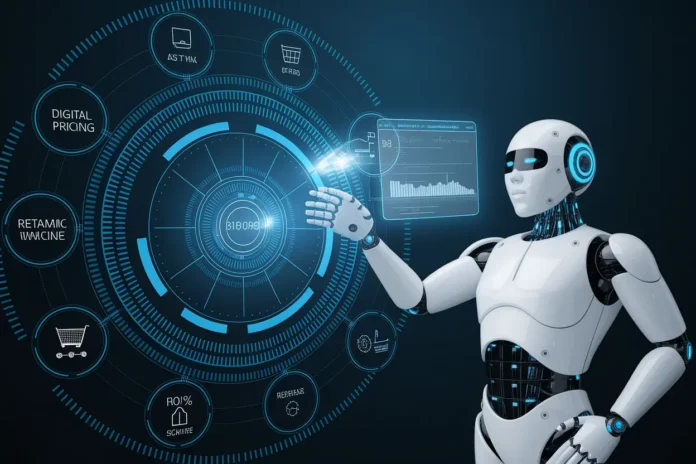AI in E-Commerce has rapidly emerged as a game-changing force, fundamentally altering how online retail operates. This powerful integration of artificial intelligence into e-commerce platforms allows businesses to offer hyper-personalized customer experiences, intelligently manage operations, and scale with precision. As we approach 2025, AI has become a mission-critical asset in digital commerce strategy, bringing automation and insight into previously human-driven processes.
Understanding AI in E-Commerce
AI in e-commerce refers to the deployment of intelligent algorithms and learning technologies—machine learning (ML), natural language processing (NLP), computer vision, and more—across retail functions. These tools learn from user behavior and system interactions, enabling automation, recommendation engines, fraud detection, and customer service enhancements.
Core Concepts Driving AI in E-Commerce
To fully embrace AI in e-commerce, businesses must understand the foundational technologies:
- Machine Learning (ML): Powers predictions based on user behavior, purchase history, and real-time patterns.
- Natural Language Processing (NLP): Enables chatbots and virtual assistants to converse naturally with users.
- Computer Vision: Recognizes and processes images for visual product search and AR features.
- Predictive Analytics: Forecasts consumer demand, pricing, and inventory needs.
Advantages of AI in E-Commerce
The integration of AI in e-commerce brings a multitude of benefits:
- Enhanced Personalization: Tailored product recommendations boost engagement and retention.
- Operational Efficiency: Automates repetitive tasks, saving resources and minimizing errors.
- Better Decision-Making: Data-driven insights support effective strategic planning.
- Scalability: Handles high volumes of data and user queries without human intervention.
Challenges of Implementing AI in E-Commerce
Despite its advantages, incorporating AI in e-commerce comes with potential hurdles:
- Data Privacy: The increasing reliance on consumer data raises security and compliance concerns.
- High Implementation Costs: Initial setup and maintenance require significant investment.
- System Complexity: Requires skilled AI specialists and developers for deployment and ongoing optimization.
- Ethical Bias: AI systems can unintentionally replicate bias contained in training datasets.
Personalized Product Recommendations Using AI in E-Commerce
One of the most successful uses of AI in e-commerce is real-time, personalized product recommendations. These models evaluate customer purchase history, browsing traits, and preferences to serve relevant products tailored to individual users.

Real-World Example: Amazon’s AI recommendation engine contributes to 35% of its revenue by customizing offerings based on previous interactions and behavior.
Customer Service Enhancement with AI in E-Commerce
AI in e-commerce fuels conversational platforms like chatbots and virtual assistants. These tools reduce customer support workload by handling FAQs, order tracking, and issue resolution 24/7.
Real-World Example: Brands like H&M employ chatbot interfaces on their websites to provide style advice, help with returns, and troubleshoot customer issues.
AI in E-Commerce Inventory Forecasting and Supply Optimization
AI in e-commerce analyzes massive datasets—including sales records, purchasing trends, seasonality, and supply chain fluctuations—to forecast demand accurately and maintain ideal inventory levels.
Real-World Example: Megaventory uses AI tools to optimize warehouse stock, reduce storage costs, and improve shipping timelines.
Visual Search and AR Powered by AI in E-Commerce
Computer vision and augmented reality are reshaping product discovery. AI in e-commerce allows consumers to use images for search or preview items in their physical space before buying.
Real-World Example: IKEA’s AR application overlays virtual furniture into real-life rooms through mobile cameras, enhancing buyer confidence.
Dynamic Pricing Strategies Using AI in E-Commerce
AI in e-commerce uses predictive modeling and competitor tracking to determine the best price points on products in real-time. Dynamic pricing boosts conversion rates and maximizes profit margins.
Real-World Example: eCommerce platforms now mirror the airline industry in their use of pricing algorithms to respond instantly to demand and market conditions.
Securing Transactions with AI in E-Commerce
Fraud detection systems powered by AI in e-commerce monitor user behavior, transaction patterns, and location mismatches to prevent unauthorized activities.
Real-World Example: Tools like Signifyd flag irregular orders by analyzing address mismatches, sudden IP changes, or atypical buying patterns in real-time.
Marketing Campaign Optimization Through AI in E-Commerce
AI automates the generation, deployment, and analysis of marketing campaigns. AI in e-commerce enables platforms to target precise audiences with personalized content formats that increase conversion rates.
Real-World Example: Jasper uses machine learning to generate personalized email copy, product descriptions, and ad creatives at scale.
Emerging Trends in AI in E-Commerce
- Voice Commerce: Shopping through voice commands is reshaping user interactions, driven by Alexa and Google Assistant.
- Agentive AI: Tools that automatically complete purchases or renew subscriptions with minimal user input.
- AI-Generated Content: Descriptions, ads, and reviews manufactured via natural language generation for thousands of SKUs in seconds.
- Micro-Segmentation: AI analyzes behavior at a granular level, delivering pinpoint marketing.
Technical Best Practices for Implementing AI in E-Commerce
To ensure the success of AI in e-commerce projects, businesses should:
- Ensure Data Quality: Clean, well-structured data enhances algorithm accuracy.
- Invest in Scalable Infrastructure: Cloud-based platforms allow elasticity as demand grows.
- Simplify Integration: Use APIs and plug-ins to incorporate AI into legacy systems.
- Allow for Continuous Learning: Systems must evolve with new data inputs to remain accurate and relevant.
Comparison: AI in E-Commerce vs Traditional Methods
| Category | Traditional | AI-Driven |
|---|---|---|
| Personalization | Manual recommendation filters | Real-time learning algorithms |
| Customer Support | 24/7 human agents required | AI chatbots available nonstop |
| Inventory | Seasonal trend guesses | Predictive demand forecasting |
| Pricing | Static price tags | Real-time price optimization |
Future of AI in E-Commerce
The next wave of AI in e-commerce will deliver deeper automation, insight, and customer satisfaction through new innovations:
- Hyper-Personalization: Even more sophisticated product targeting before users ask.
- Virtual Shopping Assistants: Entire transactions made on users’ behalf by AI bots.
- Smarter AR: Extended reality options for realistic product trials.
- Sustainable AI Applications: Eco-conscious optimization in inventory and logistics.
FAQs About AI in E-Commerce
How does AI improve customer experience in e-commerce?
AI in e-commerce enhances customer experience by offering tailored product suggestions, faster support via chatbots, and smoother navigation with visual search and smart assistants.
Is AI too expensive for small e-commerce businesses?
While advanced AI tools can be costly upfront, many cloud-based third-party solutions offer scalable pricing suitable for small to mid-sized businesses.
How does AI handle privacy concerns in e-commerce?
Companies using AI in e-commerce must comply with global data regulations like GDPR, anonymize user data, and ensure transparent policies to build trust.
What roles will AI play in the next 5 years in e-commerce?
AI in e-commerce will evolve toward full customer journey automation, advanced behavior analytics, and adaptive real-time personalization across all devices and platforms.
Conclusion: The Transformative Role of AI in E-Commerce
Integrating AI in e-commerce has brought about a significant shift in how businesses serve their customers, optimize operations, and forecast trends. Despite privacy, cost, and implementation challenges, the technology’s advantages in personalization, accuracy, and efficiency are undeniable. With rapid innovations on the horizon, businesses that leverage AI now will stay ahead in the digital commerce race.



